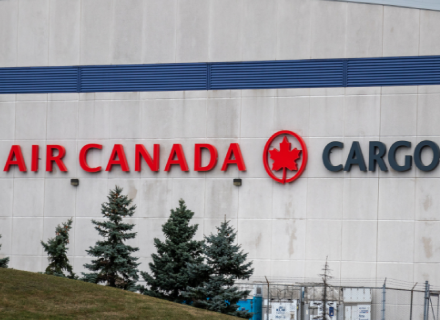Air Canada saw 18% year-on-year cargo revenue growth in the third quarter of 2024, primarily due to the thriving belly cargo in the Pacific market.
Revenues reached 253 million Canadian dollars during the quarter ended September 30, up from 215 million Canadian dollars during the third quarter of 2023, said the Montreal-headquartered airline.
In its third quarter, management discussion and analysis document, Air Canada said, “In the third quarter of 2024, Cargo revenues increased 18% from the third quarter of 2023. This was primarily due to higher yields and volumes of chargeable kilos of cargo in passenger aircraft in the Pacific market.”
“To a lesser extent, higher freighter revenues in the Americas also contributed to the increase. This was partially offset by lower belly cargo revenues and freighter revenues in the Atlantic,” Air Canada added.
During the earnings call transcript, Mark Galardo, executive vice-president, revenue & network planning and president, Cargo, commented that the airline had “surpassed expectations on our 767-freighter operation,” as he elaborated, “our right-sized network and freighter to belly commercial model are producing solid financial results that we believe are sustainable in the long run. We’re confident that cargo will continue performing.”
Mark Galardo also noted that the airline was expecting demand to continue in Q4 2024 and early into 2025, with Asia-Pacific and India strong business hotspots.
“The overall cargo environment is quite favourable. I would say it’s quite favourable in Asia-Pacific. We see similar trends in India. And those really kind of stand out in terms of weakness or any areas of concern, none at this time. And we think this cargo tailwind continues into Q4 and the early part of next year,” he commented.
Air Canada confirmed it had six Boeing 767 freighters in service as of September 30. The carrier has scaled back its freighter fleet plans considerably.
The airline had originally planned to operate a fleet of 12 freighters, 10 767Fs and two Boeing 777Fs, but in September 2023 announced the cancellation of an order for two newbuild 777Fs. Then in May 2024, Air Canada revealed it had also cancelled plans to convert two 767s into freighters.
However, the venture has now announced a comprehensive fleet modernisation plan that includes a surprising return of the Boeing 767 to passenger service. Air Canada, which previously retired its 767-300ER fleet in 2020, plans to reintegrate two of these aircraft by 2025, marking a strategic shift in its fleet composition, as per the reports.
The carrier’s five-year fleet expansion strategy reveals plans to acquire 90 new aircraft between 2024 and 2029, ranging from Airbus A321XLR, A220 to Boeing 787-10, 737 MAX, 767-300ER and 787-9, which will position the flagship carrier for sustainable business growth while maintaining operational flexibility across its domestic and international routes.
This substantial growth includes a diverse mix of wide and narrow-body aircraft, demonstrating Air Canada’s commitment to route network optimisation and operational efficiency.
As per Michael Rousseau, president and chief executive, the carrier has now reached a new four-year collective agreement with pilots represented by the ALPA union, following a pay dispute that almost resulted in strike action.
Throughout the overall business, Air Canada recorded operating revenues of 6.1 billion Canadian dollar in Q3 2024, down 4% year on year. Passenger revenues were 5.6 billion Canadian dollar, a decline of 4% from the same quarter in 2023. Air Canada also maintained a robust liquidity position of USD 10.3 billion at the 2023 end, representing a USD 500 million increase from the previous year.
The airline also prepaid approximately USD 1.3 billion of outstanding debt, including financing for 33 Airbus A220 and five Boeing 787-8 aircraft. It has now strengthened Air Canada’s unencumbered asset pool, which reached an estimated value of USD 6.6 billion by the 2023 end, excluding the value of its Aeroplan loyalty programme.
The venture will also increase direct flights to China, which remain below pre-COVID levels even though the carrier has added capacity to other Asia-Pacific routes. The daily service from Vancouver to Beijing will be resuming on January 15, as the airline eyes increasing its daily Shanghai flights from December 7 as well.
CAAC News, the official newspaper of the Civil Aviation Administration of China, said the increased flights between China and Canada would bolster trade and their economies and promote further recovery of China-Canada air transport. A Canadian source confirmed the development to Reuters.
Canada agreed to stabilise bilateral ties with China in July 2024, committing to “pragmatic” engagement with the world’s second-largest economy, even as trade remained a point of bilateral friction.
Flights between both Canada and the United States and China have not ramped back up even after COVID-era travel restrictions ended, despite airlines adding more seats to other destinations in Asia Pacific.
However, in the United States, major American passenger airlines have put off resuming some flights to China, citing lagging travel demand between the world’s two largest economies.

